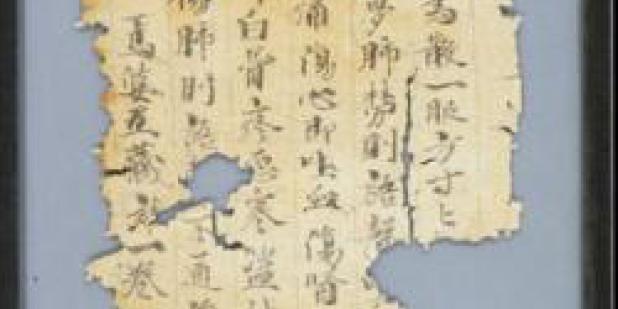Join us for a free one-day workshop for educators at the Japanese American National Museum, hosted by the USC U.S.-China Institute and the National Consortium for Teaching about Asia. This workshop will include a guided tour of the beloved exhibition Common Ground: The Heart of Community, slated to close permanently in January 2025. Following the tour, learn strategies for engaging students in the primary source artifacts, images, and documents found in JANM’s vast collection and discover classroom-ready resources to support teaching and learning about the Japanese American experience.
Indian Literature and Culture in Medieval China: A Focus on Manuscripts from Dunhuang and Turfan
The Ho Center for Buddhist Studies at Stanford presents a lecture with Professor Chen Ming from Peking University discussing translations of Indian manuscripts from Dunhuang and Turfan.
Where

Apart from a large number of Chinese translations of Indian Buddhist texts and Buddhist commentaries composed by the Chinese themselves, the Dunhuang and Turfan manuscript finds contain many other kinds of texts relating to Sino-Indian cultural exchange. These non-Buddhist manuscripts deal especially with literature (mainly folk tales), geography or travel notes, divination, science, technology and medicine. This lecture will focus on these manuscripts from Dunhuang and Turfan. Exploring them will reveal the complexity of Sino-Indian cultural exchange in the medieval period and help us to understand it better.
Chen Ming, Peking University
Speaker's Bio
Professor Chen is currently a Professor in the Department of South Asian Studies at Peking University. Since he was awarded a doctoral degree by Peking University in 1999, with a dissertation on Indian medical text Siddhasara, he has focused on the history of cultural communication between China and Central & South Asia in the Medieval Period, mainly but not exclusively in terms of medicine. His academic interests have also been extended to a study on Buddhist literature in Sanskrit-Chinese, the influence of ancient Indian literature on China, and manuscripts from Dunhuang and Turfan. In addition to some articles in English, his publications include five books, On the Sanskrit Medical Book Siddhasara(2002; 2014), Medical Manuscripts Discovered in Dunhuang and Western Regions: Foreign Medicine in Medieval China(2005), A Study on Sanskrit Text of Jivaka-pustaka from Dunhuang (2005), Foreign Medicine and Culture in Medieval China (2013), Texts and Languages: A Comparative Study on Some Manuscripts Unearthed from the Silk Road and Early Chinese Buddhist Canon (2013), all in Chinese. His current book projects involve a comparative study on vocabulary of Sanskrit-Chinese Buddhist vinaya texts, the relationship between pre-modern Sino-Indian medicine and culture in a perspective of global history.
Free and open to the public
Featured Articles
Please join us for the Grad Mixer! Hosted by USC Annenberg Office of International Affairs, Enjoy food, drink and conversation with fellow students across USC Annenberg. Graduate students from any field are welcome to join, so it is a great opportunity to meet fellow students with IR/foreign policy-related research topics and interests.
RSVP link: https://forms.gle/1zer188RE9dCS6Ho6
Events
Hosted by USC Annenberg Office of International Affairs, enjoy food, drink and conversation with fellow international students.
Join us for an in-person conversation on Thursday, November 7th at 4pm with author David M. Lampton as he discusses his new book, Living U.S.-China Relations: From Cold War to Cold War. The book examines the history of U.S.-China relations across eight U.S. presidential administrations.




